NCKU and Institute of Science Tokyo Co-organize Scientific Workshop, Highlighting Cross-Disciplinary Collaboration in Medicine, Engineering, and Semiconductors
Written & Image credit to NCKU Office of Internation Affairs.
President Meng-Ru Shen of National Cheng Kung University (NCKU) led a delegation to the Institute of Science Tokyo (Science Tokyo) from September 4 to 5, 2025, marking a milestone in strengthening academic partnerships. The series of academic exchanges showcased the interdisciplinary research achievements and forward-looking visions of both universities.
Science Tokyo President and CEO Prof. Naoto Ohtake personally received the delegation, accompanied by senior leaders including Prof. Yujiro Tanaka, President and CAO and former President of Tokyo Medical and Dental University; Prof. Mutsuko Hatano, Executive Vice President for Research and Industry-Academia-Government Collaboration; Prof. Tetsushi Furukawa, Executive Vice President for Institute Strategy and for Research and Industry-Academia-Government Collaboration; Prof. Yoichi Oshima, Vice President for Industry-Academia-Government Collaboration; Prof. Takayuki Ohba, WOW Alliance Unit Leader, Institute of Integrated Research; Prof. Kentaro Nakamura, Director of the Institute of New Industry Incubation; and Prof. Kazuya Masu, former President of Tokyo Institute of Technology and current Director of the G-QuAT Center at Japan’s National Institute of Advanced Industrial Science and Technology (AIST). Their participation underscored Science Tokyo’s commitment to deepening collaboration with NCKU.
This landmark meeting symbolizes the establishment of a long-term partnership in key academic fields and lays a strong foundation for future interdisciplinary exchange and international cooperation.
Presidential Dialogue: NCKU and Science Tokyo
The presidential meeting, held on September 4 at Science Tokyo’s Ookayama Campus, marked the beginning of a new chapter in bilateral collaboration. President Shen expressed his sincere gratitude for Science Tokyo’s warm reception and emphasized that the visit represented not only an academic exchange but also the meaningful beginning of a long-term partnership.

NCKU President Meng-Ru Shen visited Science Tokyo, leading dynamic people exchange, impactful joint research, and innovation that transform lives.
President Shen highlighted three key pillars of cooperation:
1. Dynamic People Exchange – getting Science Tokyo’s engineering students immersed in NCKU’s medical campus environment, and vice versa, bringing NCKU’s medical students into Science Tokyo’s advanced laboratory, while developing joint degree programs.
2. Impactful Joint Research – pioneering next generation surgical robots, developing an intelligent rehabilitation system for elderly patients, creating AI that can predict disease before symptoms appear, and advancing biomaterials for superior implants. These are not just advanced papers; these are life-changing solutions that people urgently need.
3. Life-Changing Innovation – establishing a joint research center in the near future and building strategic partnerships with industry; more importantly, getting these breakthrough technologies into the real world, where they can help millions of people.
President Shen concluded that the future of science lies at this precise intersection, where clinical expertise meets cutting-edge engineering. This collaboration presents an extraordinary opportunity to shape the future together.
Subsequently, Professor Sun-Yuan Hsieh, Vice President for International Affairs of NCKU, introduced the university’s history, distinctive features, and recent achievements, while reflecting on the historical legacy of its first president, Michitaka Wakatsuki. He also proposed short-, medium-, and long-term collaboration concepts.
Regarding the outlook for collaboration between the two universities, Executive Vice President Shyy-Woei Chang highlighted short-term priorities, including short-term faculty and student exchanges, joint supervision programs for master’s and doctoral students, and dual-degree programs for graduate students. The long-term goals focus on implementing key joint research projects in medicine, engineering, or interdisciplinary medical-engineering fields.
Professor Sun-Yuan Hsieh, Vice President for International Affairs of NCKU, outlined the short-, medium-, and long-term collaboration plans between NCKU and Science Tokyo.
1. Short-Term Plan:
It is proposed to initiate bilateral faculty exchanges and dual-degree program cooperation to promote academic interaction. Specifically, for faculty exchanges, the two universities could initially pilot an annual exchange of two faculty members to engage in teaching and research collaboration at the partner institution. Additionally, a dual-degree program is recommended, particularly at the master’s and doctoral levels, including joint master’s programs, joint doctoral programs, or integrated master-doctoral pathways. This collaboration would fully leverage the research strengths of both universities. Through joint supervision and research collaboration, graduate students’ research capabilities would be significantly enhanced, fostering academic development for both institutions. Moreover, NCKU proposes a joint appointment scheme for faculty or researchers, including inviting professors or researchers from Science Tokyo to hold joint positions at NCKU research centers, thereby guiding graduate student theses and research projects.
2. Medium-Term Plan:
To further promote collaborative research, NCKU proposes initiating a “NCKU–Science Tokyo Research Day.” This event would be held alternately each year at the two universities, focusing on key disciplines such as science, engineering, biomedical engineering, and medicine. This bilateral platform will allow scholars from both institutions to share insights, build networks, and foster in-depth, targeted international research collaborations.
3. Long-Term Plan:
To align with national policies and lead industrial development, NCKU plans to establish several strategic research hubs, three of which will focus on disaster prevention, satellite technology, and smart healthcare/wellness. NCKU will allocate resources and funding to invite faculty and researchers from Science Tokyo to form joint research teams with NCKU faculty to execute related projects, enabling deep international research collaboration.
The forum was led by Naoto Ohtake, President and CEO, with a delegation that included Yujiro Tanaka, President and CAO ; Tetsushi Furukawa, Executive Vice President for Institute Strategy and Research and Industry-Government-Academia Collaboration; Tomohiro Morio, Executive Vice President for Global Affairs, and a total of seven senior representatives. From NCKU, the delegation included President Meng-Ru Shen; Shyy-Woei Chang, Executive Vice President ; Sun-Yuan Hsieh, Vice President for International Affairs; Jian-Hong Wu, Vice President for General Affairs; Hsiu-Chi Cheng, Dean of the College of Medicine; and Yan-Kuin Su, Dean of the Academy of Innovative Semiconductor and Sustainable Manufacturing, among other representatives.
NCKU- Science Tokyo Technical Forum: Interdisciplinary Synergy
The joint Technical Forum, held on September 4 at Science Tokyo’s Ookayama Campus, featured keynote remarks by Naoto Ohtake, President of Science Tokyo, and Meng-Ru Shen, President of NCKU. President Shen emphasized Taiwan’s strengths in semiconductor innovation and sustainable manufacturing, and how integration with Science Tokyo’s frontier medical and smart technology research could lead to breakthroughs in smart healthcare, bio-semiconductors, precision medicine, and sustainable health technology.
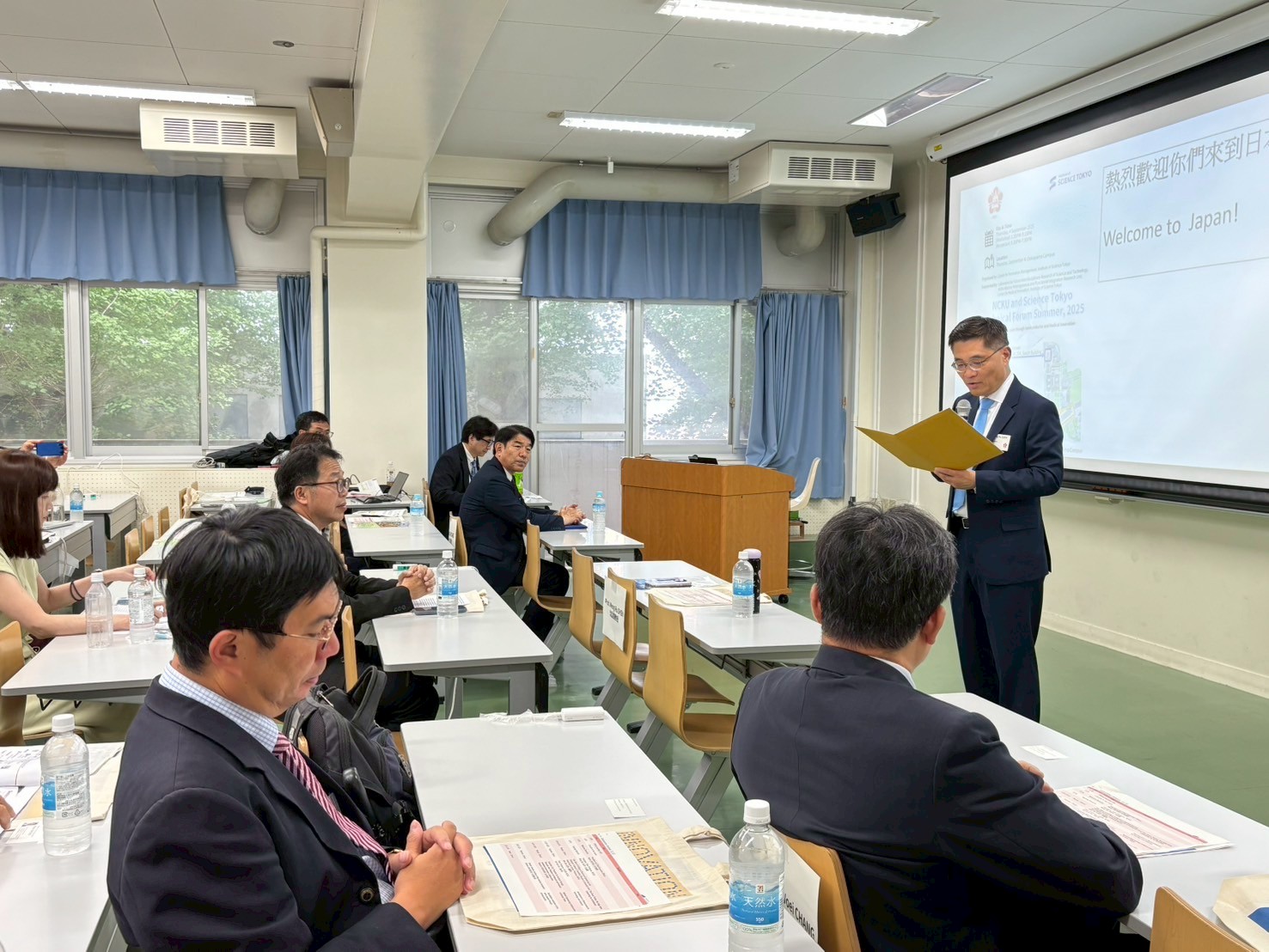
NCKU President Meng-Ru Shen expressed the shared commitment of both universities to shaping the future of science, technology, and medical development.
President Shen remarked:
“The challenge we face from an aging population to climate change, from pre-treatment medicine to sustainable technology, requires exactly this kind of international collaboration and interdisciplinary thinking. As we share our research findings today, I encourage all of us to think beyond individual discovery and consider how our combined expertise can accelerate breakthroughs that neither institution can achieve alone.”
President Shen concluded by emphasizing that the scientific medium represents more than an exchange of ideas.
“It is the foundation of a lasting partnership that will benefit not only our institutions and our nations, but humanity as a whole.”
Following this, representatives from both universities delivered keynote presentations on research and development strategies. A total of eight speakers from the two universities and the Taiwan Semiconductor Research Center of the National Applied Research Laboratories gave briefings. The session was chaired and organized by Prof. Yoichi Oshima, Vice President for Industry -Academia-Government Collaboration and Prof. Toru Inoue, Associate Director of Center for Innovation Management.
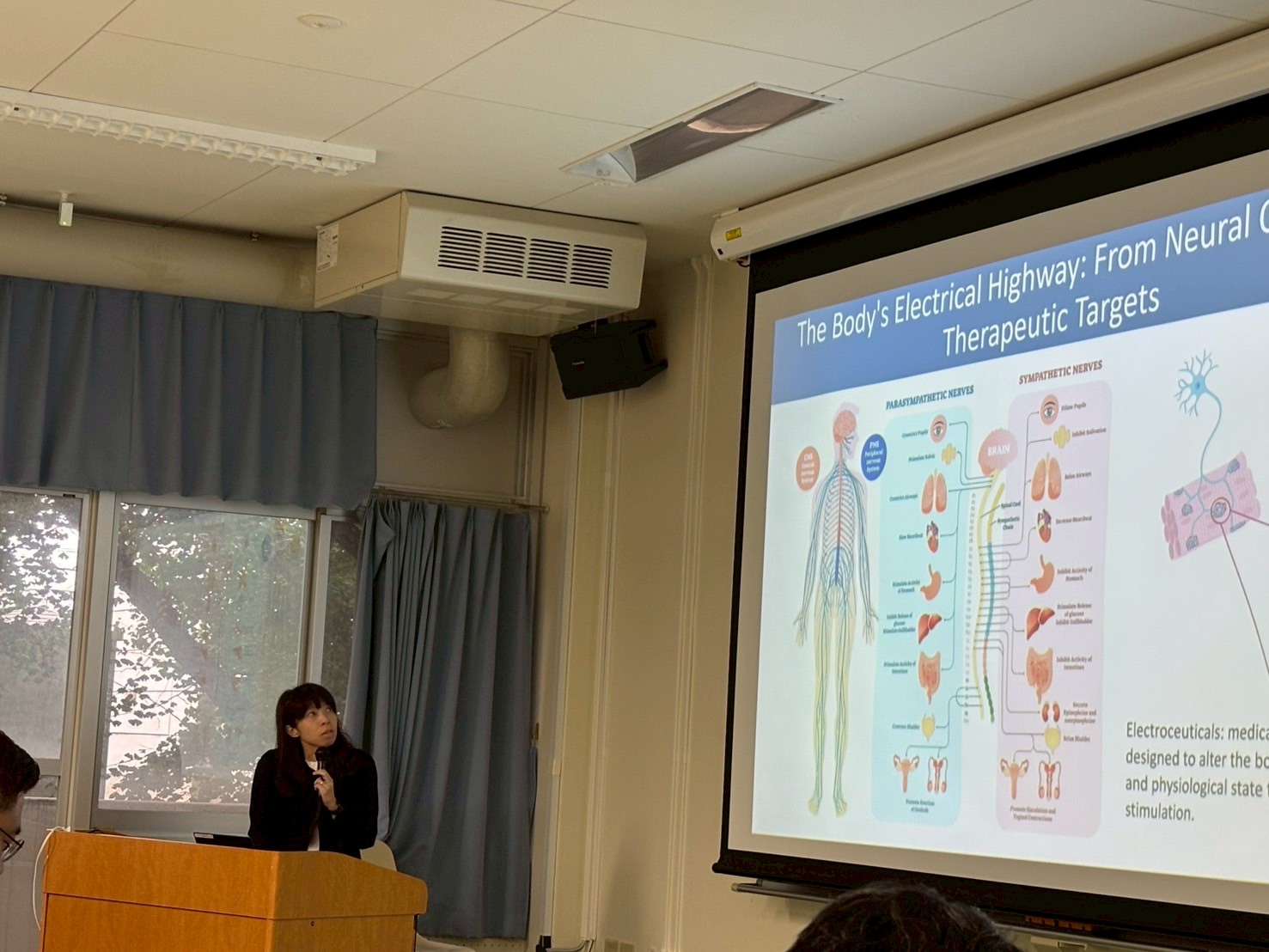
Dr. Ya-Ting Hsu from Division of Hematology, Department of Internal Medicine at NCKU Hospital introduced the Advanced Bioelectronic Medicine Research Center at NCKU, highlighting its integrated interdisciplinary platform and efforts to advance innovations and clinical applications in bioelectronic medicine.
Eight representatives from NCKU, Science Tokyo, and Taiwan Semiconductor Research Institute (TSRI) delivered presentations on strategic research directions. Prof. Tetsushi Furukawa noted that Science Tokyo’s merger in 2024 significantly elevated its research capacity by integrating medicine, science, and engineering, setting Imperial College London as a benchmark. Prof. Kentaro Nakamura demonstrated advances in quantitative evaluation of microvessels through photoacoustics. Prof. Takayuki Ohba highlighted cross-border semiconductor innovation for next-generation 3D integration. And Prof. Kazuya Masu underscored the importance of national policy support in green transformation, semiconductors, quantum technology, and AI, while stressing academia’s pivotal role as a catalyst for international industry-government collaboration.
Prof. Ying-Zong Juang, TSRI Deputy Director, introduced Taiwan’s Academic Open Foundry model, offering comprehensive IC development support from design to prototyping, which has become a vital bridge between Taiwan’s semiconductor industry and academia since 2019.
The entire exchange highlighted the strong interdisciplinary capabilities of Science Tokyo and its partners in medicine, engineering, and semiconductors, and underscored the critical value of cross-disciplinary integration and international collaboration in driving future technological and societal development.
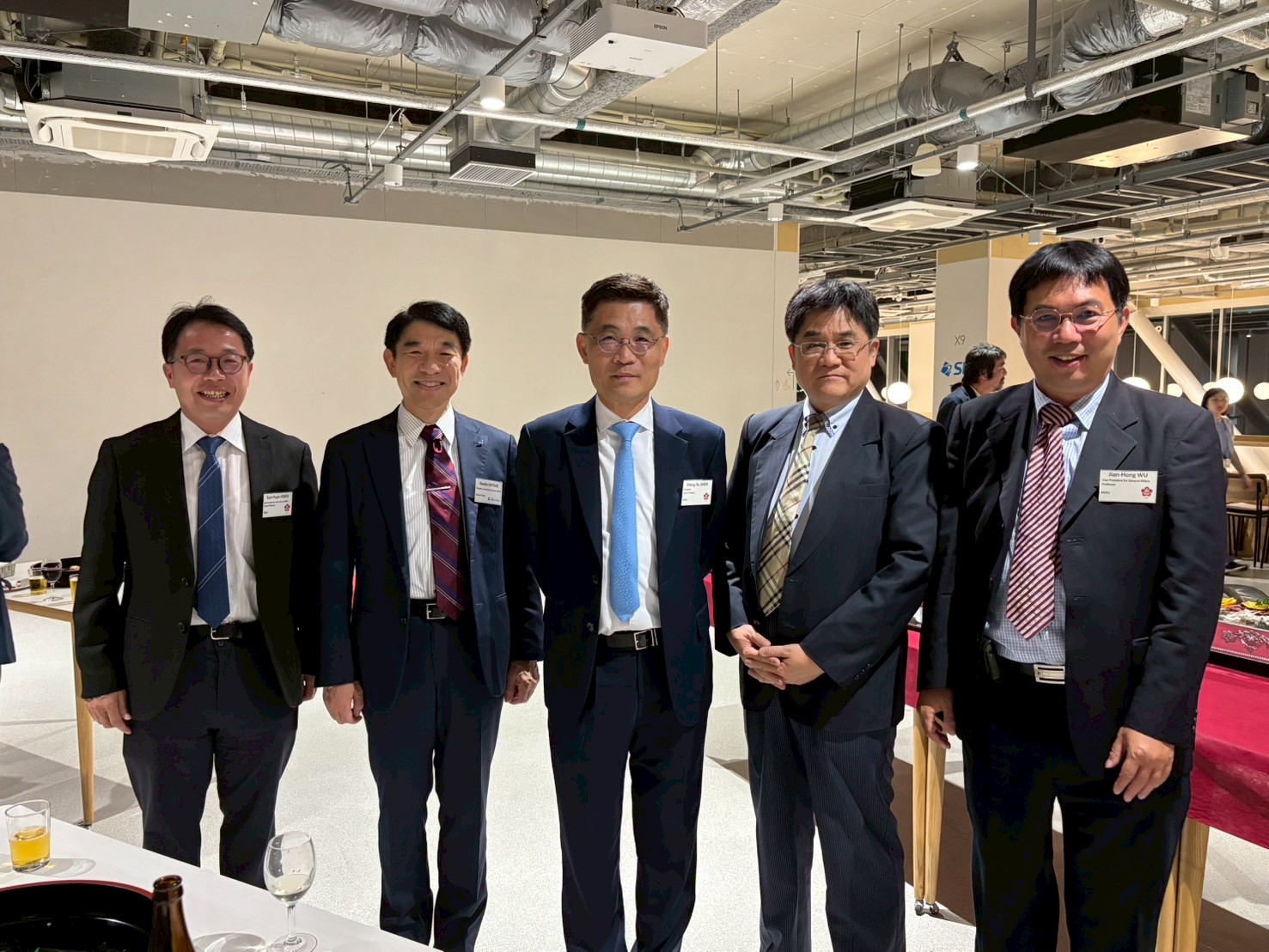
Science Tokyo, led by President and CEO Naoto Ohtake (second from left), warmly received President Meng-Ru Shen (center) and the NCKU delegation, along with senior administrators and scholars.
At the conclusion of the forum, Science Tokyo graciously hosted a welcome dinner for the entire visiting delegation. President Naoto Ohtake attended the event, during which Mutsuko Hatano, Executive Vice President of Science Tokyo and Shyy-Woei Chang, Executive Vice President of NCKU, jointly proposed a toast, celebrating the successful collaboration. They expressed anticipation for deeper future cooperation in medicine, engineering, semiconductors, and other fields, aiming to establish a long-term partnership built on a solid and enduring foundation.
NCKU and Science Tokyo Medical Session
On the morning of September 5, the Medical Session was held at Science Tokyo’s Yushima Campus under the theme “Advancing the Application of Medical Data.” The event opened with remarks by Prof. Sun-Yuan Hsieh, Vice President for International Affairs at NCKU, who introduced the university’s pioneering work in smart healthcare, precision medicine, and digital health.
Participants included Prof. Yujiro Tanaka, Science Tokyo President and CAO; Prof. Tetsushi Furukawa, Executive Vice President for Institute Strategy and for Research and Industry-Acaademia-Government Collaboration; Prof. Atsuhiro Kinoshita, Vice President for Digital Transformation and Medical Information Infrastructure; Prof. Koji Fujita, Vice President for Biomedical Engineering and Integrated Research and Innovation; and Prof. Yoichi Oshima, Vice President for Industry-Academia-Government Collaboration.
The session also featured three keynote speakers: Specially Appointed Associate Professor Akifumi Endo from M&D Data platform Section, Center for Medical Innovation; Prof. Tetsuo Sasano, Director of the Institute of Biomedical Engineering and Chair of the Department of Cardiovascular Medicine; and Lecturer Risako Mikami from the Graduate School of Medical and Dental Sciences. In total, 22 representatives from both universities participated. The event was organized and chaired by Prof. Yoichiro Isobe of the Medical Innovation Agency, Division of Innovative Promotion Office.
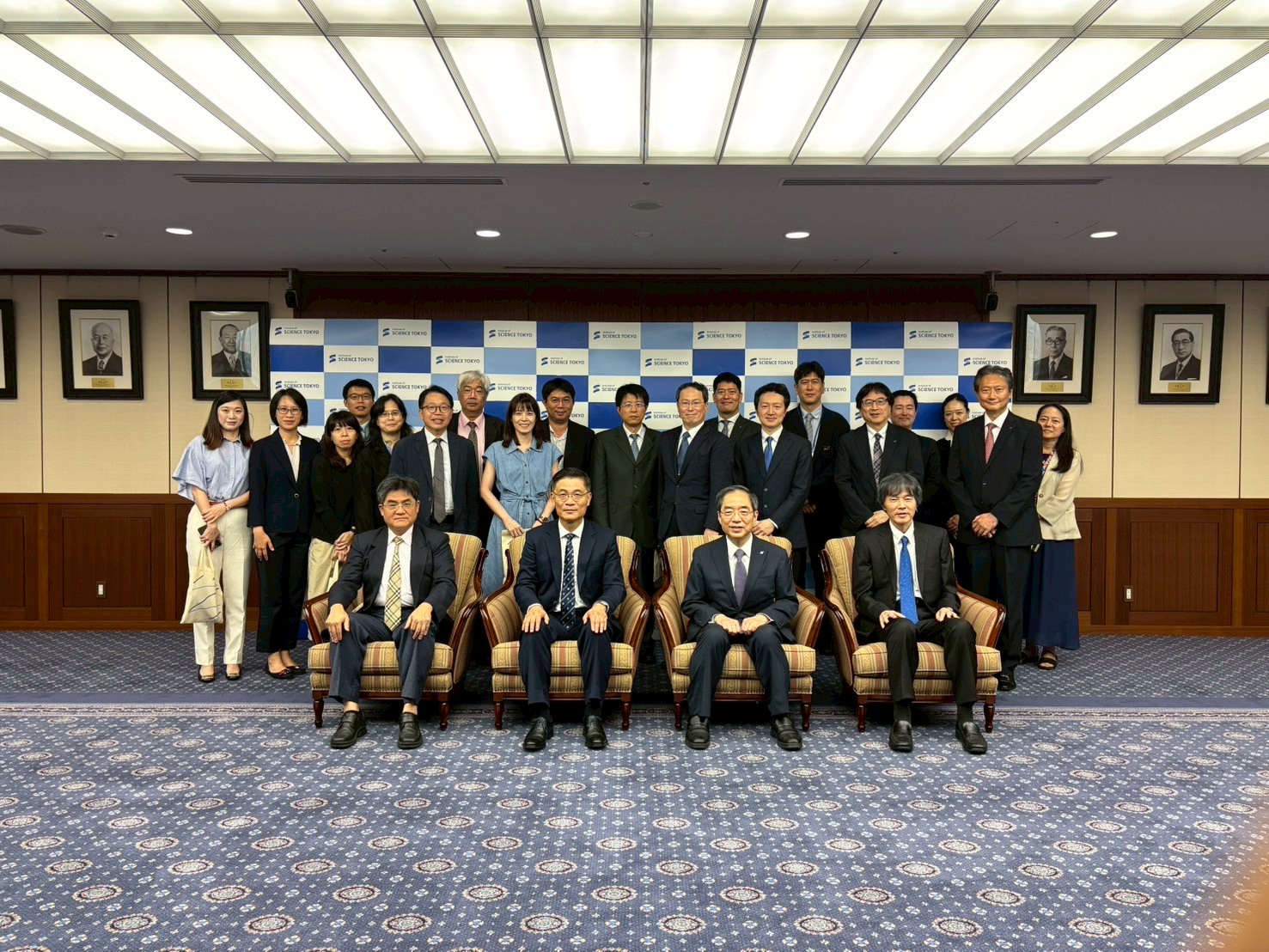
The Medical Session, held at Science Tokyo’s Yushima Campus, was organized under the theme “Advancing the Application of Medical Data.”
NCKU representatives highlighted their efforts and achievements in medical data applications, including:
1. The practice of precision medicine and telehealth
2. The integration of multi-omics and artificial intelligence
3. The application of digital health in sports medicine
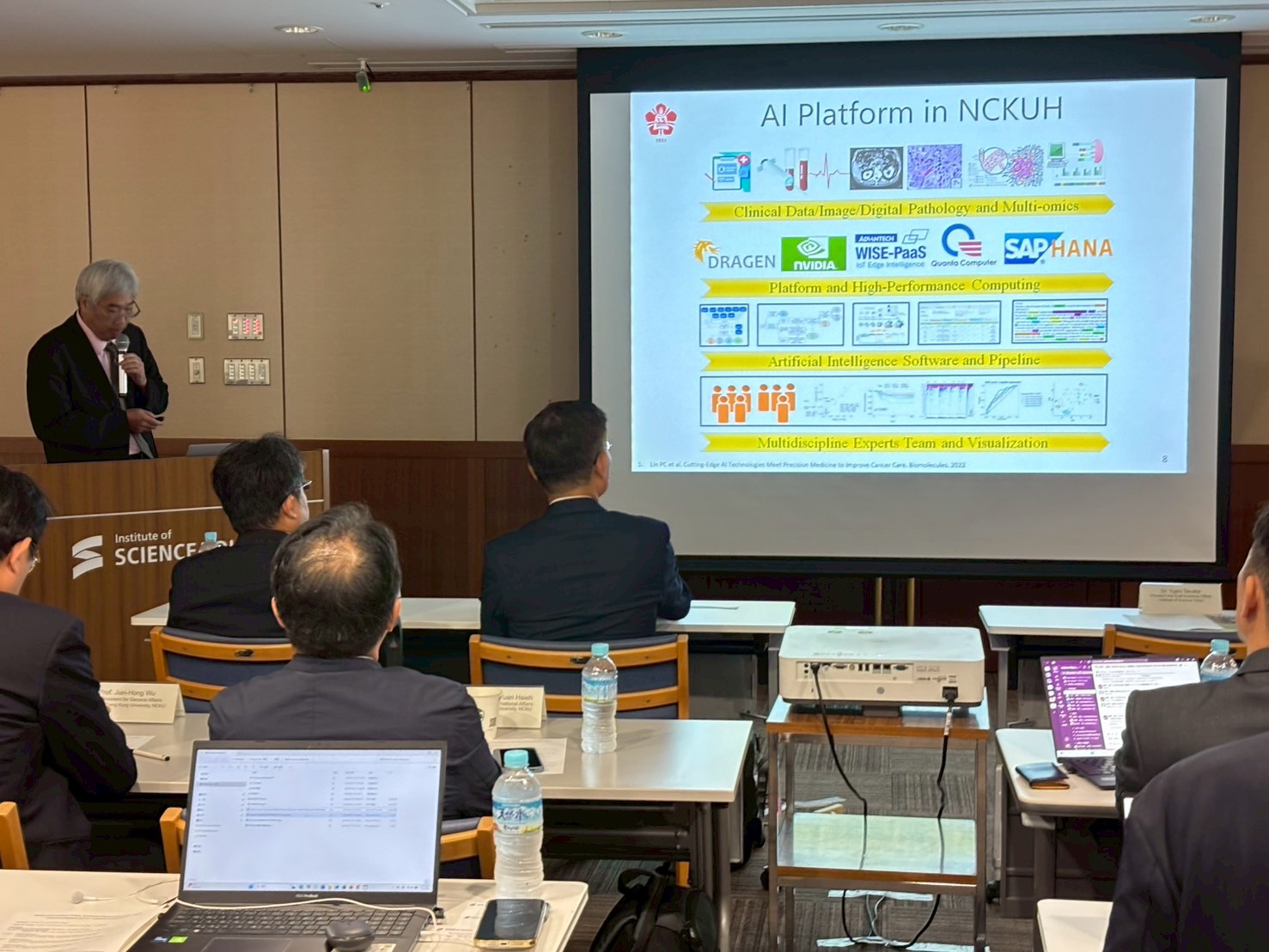
Dr. Peng-Chan Lin, Deputy Superintendent of NCKU Hospital, presented how the integration of multi-omics and artificial intelligence is advancing precision medicine.
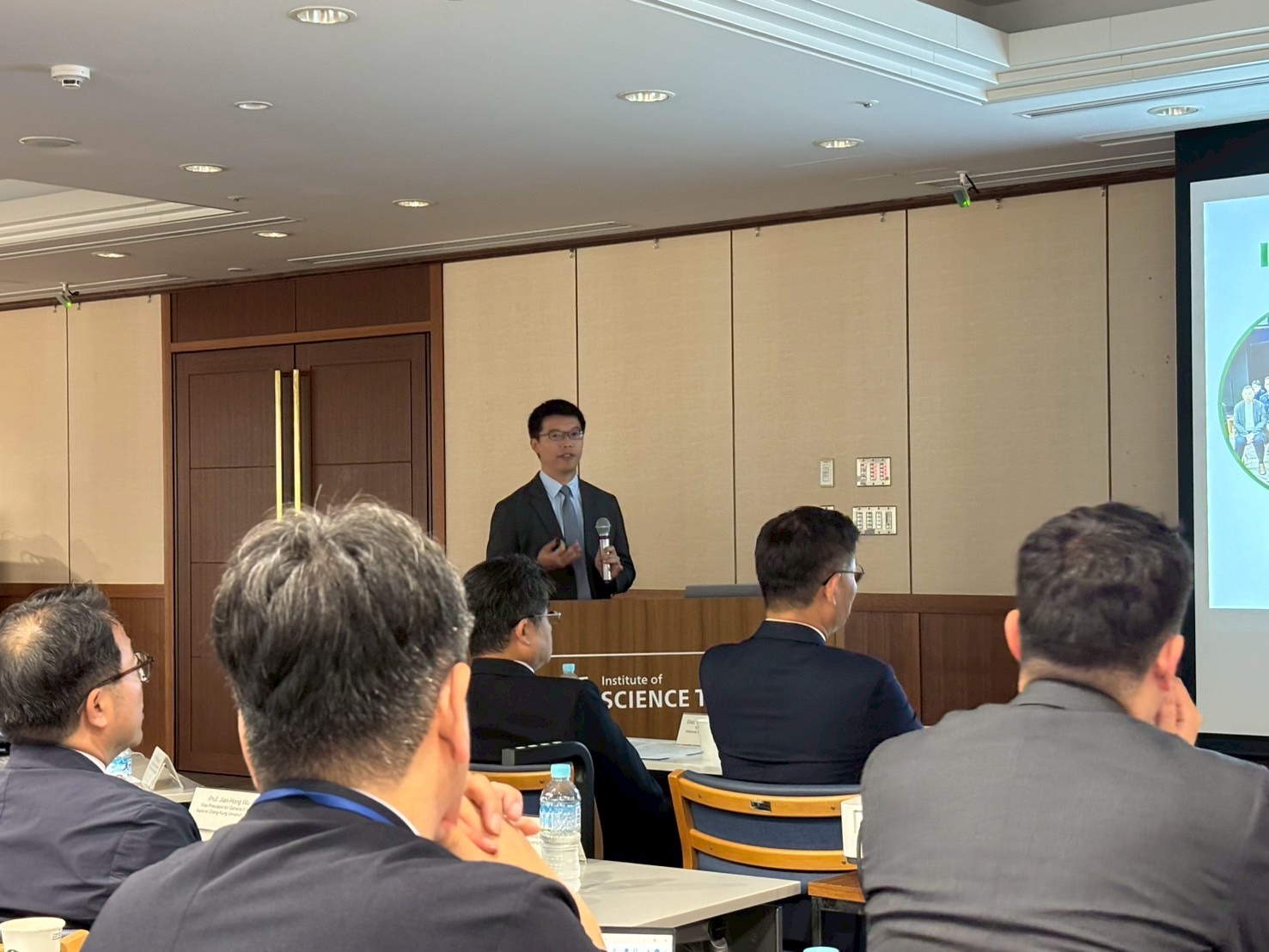
Dr. Kai-Lan Hsu of the Department of Orthopedics, NCKU Hospital, shared the integrated application of digital health to enhance performance in elite athletes.
On the Science Tokyo side, Associate Professor Akifumi Endo of the Center for Medical Innovation presented “Overview of the Medical Data Utilization Committee Project,” outlining Japan’s current practices and regulatory framework in medical data applications. Prof. Tetsuo Sasano, Director of the Institute of Biomedical Engineering and Chair of the Department of Cardiovascular Medicine, delivered a talk on “Precision Medicine for Stroke Prevention,” sharing clinical outcomes and case studies. Lecturer Risako Mikami of the Graduate School of Medical and Dental Sciences discussed “Insights from Real-World Data on the Value of the Integrated Medical and Dental Care,” highlighting cross-disciplinary research experiences and new findings. Throughout the symposium, representatives from both universities engaged in in-depth exchanges and discussions, sharing the latest developments and breakthroughs in medical data applications in Taiwan and Japan, while exploring potential directions for future collaboration.
Prof. YujiroTanaka delivered the closing remarks of the medical session, outlining the goals and mission following the merger of Tokyo Medical and Dental University with Tokyo Institute of Technology. He highlighted that the newly established Science Tokyo aims to advance interdisciplinary research integrating medicine, science, and engineering, thereby enhancing academic excellence and societal impact. He also expressed his hope that Science Tokyo will continue to promote science and human welfare, and collaborate with NCKU to create value for society.
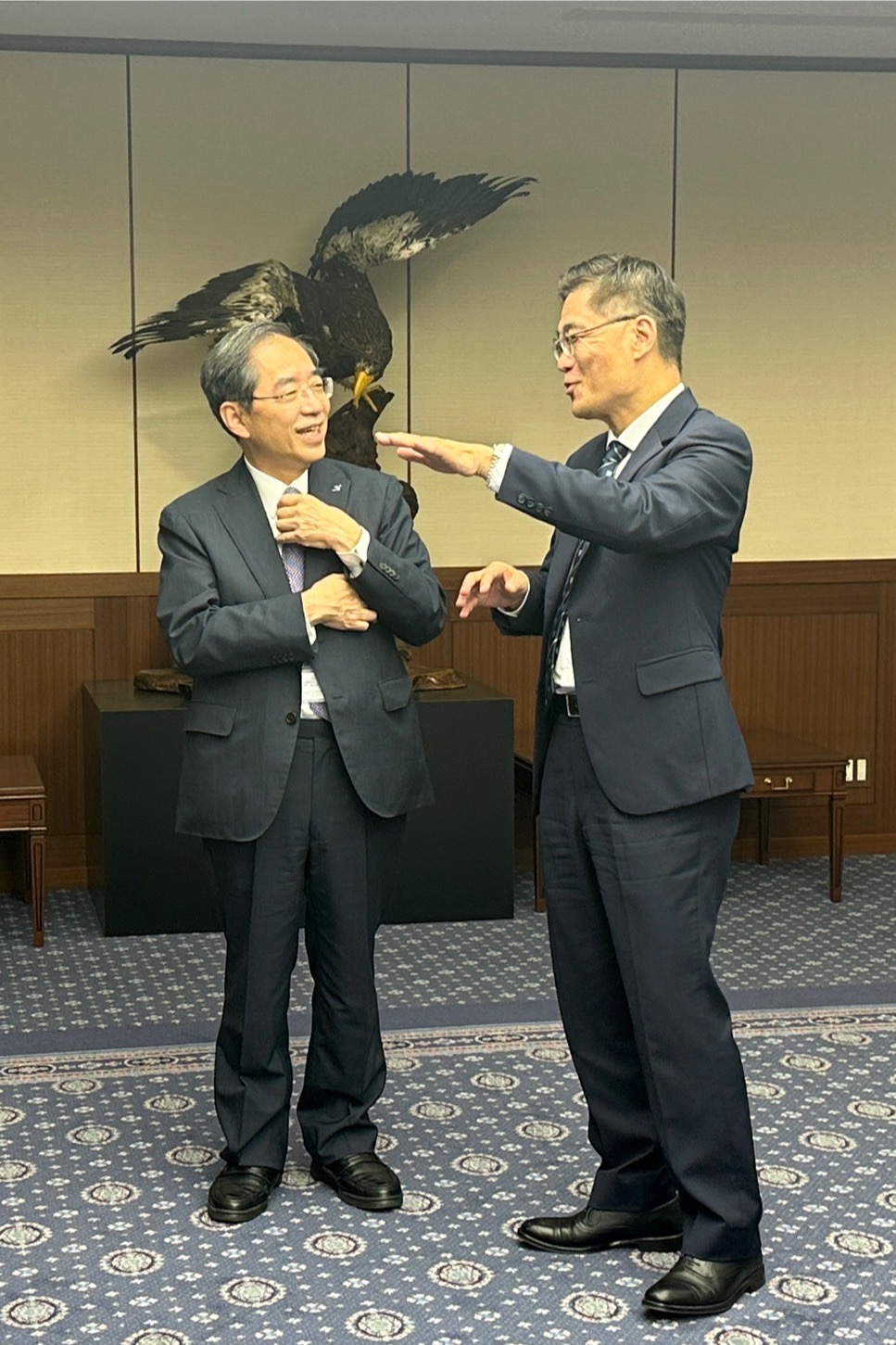
NCKU President Meng-Ru Shen engaged in close discussions with Prof. YujiroTanaka, President and CAO of Science Tokyo (former President of Tokyo Medical and Dental University), focusing on the integration of medical, engineering, and intelligent computing technologies, and exploring potential collaboration in interdisciplinary research and applications.
After the conclusion of the medical session, Prof. Yujiro Tanaka, President and CAO of Science Tokyo, cordially invited President Shen and the NCKU delegation, along with all conference participants, to the main conference hall for a group photo in front of the university’s former presidents’ portrait wall, marking a successful conclusion to the medical exchange.
Semiconductor Session between NCKU and Science Tokyo
On the 5th, the semiconductor session was hosted at the Suzukakedai Campus of Science Tokyo. The semiconductor session is an important annual academic exchange involving mutual visits between the two universities. This year, a total of 17 representatives from both universities participated, and the event was organized by the Laboratory for Future Interdisciplinary Research of Science and Technology (FIRST) at Science Tokyo.

In recent years, NCKU, Science Tokyo, and the Taiwan Semiconductor Research Institute have jointly developed technological advantages in heterogeneous integrated semiconductor packaging, with promising breakthroughs anticipated in the future.
Both parties discussed potential collaboration in next-generation advanced packaging and power semiconductor applications, including the development of silicon carbide (SiC), aluminum nitride (AlN), and gallium nitride (GaN) devices, as well as utilizing artificial intelligence for process monitoring and yield prediction. They also proposed establishing a joint research center, promoting postdoctoral and graduate student exchanges, and leveraging industrial resources from both countries to apply for research projects, aiming to create an international-level semiconductor R&D platform.
Future Prospects and Vision of NCKU and Science Tokyo
National Cheng Kung University (NCKU) has long been committed to integrating interdisciplinary research, industry-academia innovation, and societal engagement. Its academic framework spans multiple fields—from science and engineering to medicine, management, design, social sciences, computing, and semiconductors—demonstrating a comprehensive system that fosters cross-disciplinary and diversified development.
Science Tokyo, established in 2024 through the merger of Tokyo Medical and Dental University and Tokyo Institute of Technology, inherits the research strengths of both institutions. The university combines expertise in medicine, dentistry, and life sciences with engineering, materials, and information technology, deliberately breaking traditional disciplinary boundaries. Its aim is to enhance long-term interdisciplinary research and translational capabilities, strengthening the linkage between fundamental research, clinical/application, and industry.
Since its merger in October 2024, Science Tokyo has focused not only on basic and applied research but also on co-creating societal value as a core mission. The university’s mission is “to advance science and human welfare, creating value for society and with society.”
Founded in 1931, NCKU was originally Taiwan’s premier institution for industrial education and played a key role in driving Taiwan’s industrialization. Over the years, the university has set benchmarks in industrial foundation, infrastructure collaboration, urban development, national defense, and epidemic prevention, becoming an institution that inspires the city and makes the nation proud.
Guided by societal needs, committed to interdisciplinary innovation, and fostering a collaborative ecosystem across academia, industry, and government, NCKU and Science Tokyo plan to advance their partnership through faculty and student exchanges, joint graduate dual-degree programs, and collaborative research projects. They firmly believe that knowledge sharing and technological exchange will enable both universities to drive groundbreaking research and innovative applications, generating profound impacts on academia, industry, and society. This collaboration not only marks a significant milestone in their partnership but also symbolizes their shared commitment to shaping the future of science, technology, and medical development.
Read more:NCKU President Shen Leads Delegation to Science Tokyo to Strengthen Strategic Partnership
Read more:NCKU President Shen Leads Delegation to Science Tokyo to Strengthen Strategic Partnership
Provider:
NCKU News Center
Date:
2025-09-17




